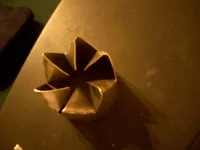- :
- Protege5 2003
Ok, here's a thought for you guys that advocate coasting in neutral (5 speed).
What kidn of life do you expect to get out of your clutch?.
Shifting out of gear and into neutral should not cause significant wear on the clutch since at release the two sides are moving at exactly the same speed.
Shifting back into gear will wear the clutch varying amounts depending on how well the driver matches the motor speed to the transmission speed. Clearly if the driver coasts and lets the motor's RPMs drop to idle and then just pops the clutch that will cause a lot of wear. If the driver gives the motor a bit of gas first to match the RPMs fairly well, wear should be minimal.
It was always my impression that most of the wear on the clutch was coming from starting the car from a dead stop, where there was no choice but to let the clutch out slowly and let the drag inside the clutch pull the transmission up to speed. This is one reason why you go through a lot of clutches if you live in a hilly city. Once the car is moving you can shift between gears without using the clutch at all if you're very careful about matching RPMs and the synch in the transmission is pretty good. Not that the transmission should be subjected to that kind of treatment, my point is that if the car is driven properly the clutch isn't doing all that much when shifting between gears once the car is moving.

